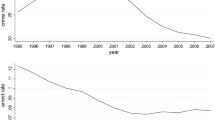Abstract
In the years 2000 and 2001 the Russian parliament passed tax laws which revolutionised the tax system. The laws on both direct and indirect taxes were substantially altered—with the result that Russia today has a modern and internationally competitive tax system which may even serve as a model for tax reform in the industrialised countries of the West. The following article describes the old tax system, its evolution and its economic effects, outlines the main features of the new system, gives examples for the positive effects it has already had and, finally, makes some propositions for further reform.
Similar content being viewed by others
References
see, e.g., E.C. Perotti, G. Stanislav: Red Barons or Robber Barons? Governance and Investment in Russian Financial-Industrial Groups, in: European Economics Review, Vol. 45, 2001, pp. 1601–1617).
R. Götz: Die große Steuerreform in Russland, Aktuelle Analysen des Bundesinstituts für ostwissenschaftliche und internationale Studien, No. 28, 1997, p. 3; T. Popova, M. Tekoniemi: Challenges to Reforming Russia's Tax System, in: Review of Economies in Transition, No. 1, 1998, pp. 13–30, here p. 14.
T. Popova, M. Tekoniemi, op. cit., Challenges to Reforming Russia's Tax System, in: Review of Economies in Transition, No. 1, 1998, p. 16.
R. Grinberg: Institutional Failures of Market Transformation of the Russian Economy, pp. 95–97, in: P.J.J. Welfens, E. Gavrilenkov (eds.): Restructuring, Stabilizing and Modernizing the New Russia, Berlin 2000, Springer, pp. 89–100.
T. Popova, M. Tekoniemi, op. cit., Challenges to Reforming Russia's Tax System, in: Review of Economies in Transition, No. 1, 1998, pp. 14.
See, e.g., L. Ebrill, O. Havrylyshyn: Tax Reform in the Baltics, Russia, and Other Countries of the Former Soviet Union, IMF Occasional Paper No. 182, 1999, pp. 10–14; R. Götz, op. cit., Die große Steuerreform in Russland, Aktuelle Analysen des Bundesinstituts für ostwissenschaftliche und internationale Studien, No. 28, 1997, p. 2; M. Levin, G. Satarov: Corruption and Institutions in Russia, in: European Journal of Political Economy, Vol. 16, 2000, pp. 113–132.
T. Popova, M. Tekoniemi, op. cit., Challenges to Reforming Russia's Tax System, in: Review of Economies in Transition, No. 1, 1998, p. 14.
E. Egorova, Y. Petrov: A Comparative Study of Taxation In Foreign Countries and the Reform of the Russian Tax System, in: Economic Systems, Vol. 21, No. 4, 1997, pp. 360–364, here p. 362; E. Gavrilenkov: Permanent Crisis in Russia: Selected Problems of Macroeconomic Performance, p. 459, in: P.J.J. Welfens, E. Gavrilenkov (eds.), op. cit., Restructuring, Stabilizing and Modernizing the New Russia Berlin 2000, Springer, pp. 441–462; T. Popova, M. Tekoniemi, op. cit., Challenges to Reforming Russia's Tax System, in: Review of Economies in Transition, No. 1, 1998, p. 14.
L. Ebrill, O. Havrylyshyn, op. cit.,.
For an overview, see the contributions in P.J.J. Welfens, E. Gavrilenkov (eds.), op. cit.,.
E. Gavrilenkov, op. cit.,, pp. 441–462.
See e.g. L. Ebrill, O. Havrylyshyn, op. cit.,, p. 8; E. Gavrilenkov, op. cit., Restructuring, Stabilizing and Modernizing the New Russia, Berlin 2000, Springer, pp. 460–461; R. Götz, op. cit., Die große Steuerreform in Russland, Aktuelle Analysen des Bundesinstituts für ostwissenschaftliche und internationale Studien, No. 28, 1997, p. 3; T. Popova, M. Tekoniemi, op. cit., Challenges to Reforming Russia's Tax System, in: Review of Economies in Transition, No. 1, 1998, p. 26–28.
R. Götz, op. cit.,, p. 1.
See e.g. P.J.J. Welfens: Analyse der Russischen Transformationskrise 1998, in: P.J.J. Welfens et al. (eds.): Systemtransformation in Deutschland und Rußland, Heidelberg 1999, Physica, pp. 550–566.
L. Ebrill, O. Havrylyhyn, op. cit.,, p. 2.
Significantly, the US magazine TIME, in its “The Best and Worst of 2001” section of the double issue of December 31, 2001 and January 7, 2002, praises the Russian tax reform as the “best reform” of 2001 (p. 102).
T. Popova, M. Tekoniemi, op. cit., Challenges to Reforming Russia's Tax System, in: Review of Economies in Transition, No. 1, 1998, pp. 26–28.
E. Gavrilenkov: Towards Credible Monetary and Fiscal Policies in Russia, p. 206, in: P.J.J. Welfens, E. Gavrilenkov (eds.), op. cit.,, pp. 189–208.
S. Ivanova: Minus 3 Percent, in: Gazeta RU, No. 10, January 22, 2002, p. 2.
L. Ebrill, O. Havrylyshyn, op. cit.,, p. 16.
Author information
Authors and Affiliations
Rights and permissions
About this article
Cite this article
Pogorletskiy, A., Söllner, F. The Russian tax reform. Intereconomics 37, 156–161 (2002). https://doi.org/10.1007/BF02928875
Issue Date:
DOI: https://doi.org/10.1007/BF02928875




